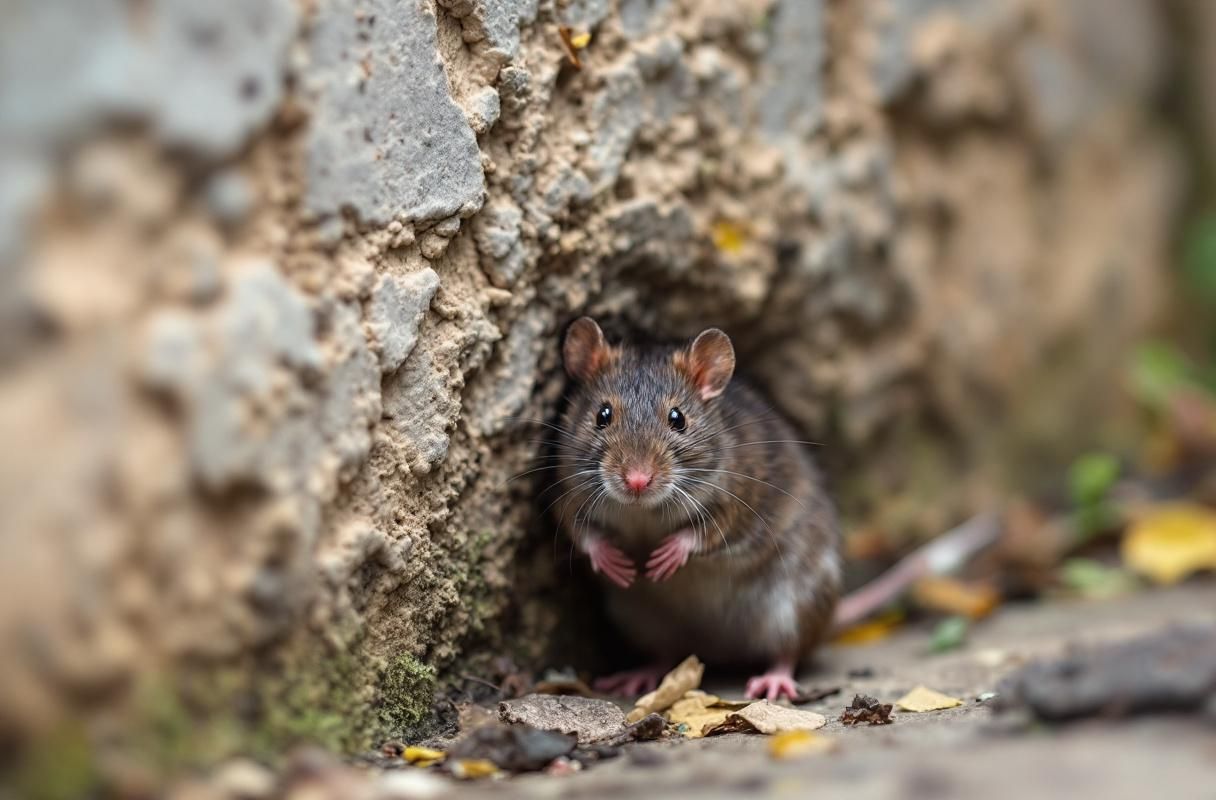Key Takeaways
- Rat droppings, gnaw marks, and shredded nesting materials are telltale signs of infestation.
- Rats often seek warm, hidden spots like attics, basements, and behind appliances.
- Sealing entry points and maintaining cleanliness can help prevent infestations.
- DIY methods have limitations and may not address the root of the issue.
- Professional pest control services offer precise, long-term solutions.
Rats are more than just a nuisance—they pose serious health risks and can cause structural damage to your home. In Oregon, the state’s varied climate and urban-rural landscapes make properties particularly vulnerable to rat infestations. Recognizing the signs early and taking decisive action can save homeowners stress, money, and ongoing problems.
This guide breaks down everything you need to know about rat nesting behavior, common warning signs, prevention strategies, and why professional pest control remains the most effective long-term solution.
Recognizing the Signs of Rat Activity
Identifying rat nesting begins with understanding the most common symptoms of their presence. Keep an eye out for:
- Droppings: Small, black pellet-like droppings usually found in areas near food, garbage, or suspected entry points.
- Urine stains: Often noticeable in low-light with a UV flashlight, indicating rat traffic.
- Gnaw marks: Rats chew through wood, plastic, drywall, and even electrical wires.
- Shredded materials: Paper, fabric, and insulation used to build nests.
- Unusual noises: Scratching or scurrying sounds at night, especially in ceilings or behind walls.
Early detection can prevent a small problem from escalating into a full-blown infestation.

Understanding Rat Nesting Behavior
Rats prefer warm, secure, and dark environments that are close to food and water sources. In Oregon homes, these typically include:
- Attics
- Basements
- Wall voids
- Behind kitchen appliances
- Crawl spaces
Rats are social and often build multiple nests for breeding and foraging. Because they are nocturnal, you may not see them during the day, making it essential to identify indirect signs of their activity.
The Dangers of a Rat Infestation
Beyond the unpleasantness of their presence, rats can pose serious problems:
- Health risks: Rats can carry diseases like leptospirosis and salmonella, which spread through droppings or urine.
- Structural damage: Their constant gnawing can compromise insulation, drywall, and electrical wiring, increasing fire risk.
- Food contamination: Open food packages and pantries are common targets.
Addressing an infestation promptly minimizes the risks to your family and home.
Prevention Tactics for Oregon Homes
Taking proactive steps can greatly reduce the likelihood of rat nesting:
- Seal entry points: Inspect your foundation, vents, doors, and windows for gaps. Use steel wool, caulk, or mesh to block access.
- Manage outdoor spaces: Trim back vegetation and eliminate piles of wood, leaves, or debris that rats might use as shelter.
- Store food properly: Use airtight containers and avoid leaving pet food out overnight.
- Secure garbage: Use bins with tight-fitting lids and avoid letting waste accumulate.
These simple practices create an environment that is less attractive to rodents.

Common DIY Approaches—And Their Limitations
Many homeowners attempt to resolve rat problems using DIY methods such as traps, poisons, or natural deterrents like essential oils. While these may offer temporary relief, they often fail to address the root of the problem:
- Traps need proper placement and regular monitoring.
- Rodenticides pose risks to pets, children, and non-target wildlife.
- Natural repellents may only work in very mild cases.
Additionally, rats are intelligent and often avoid repeated threats, making basic methods ineffective for established infestations.
Why Professional Services Offer Better Results
Bringing in pest control professionals offers several critical advantages:
- Expert identification: Professionals know how to identify nesting sites and access points that homeowners may overlook.
- Custom treatment plans: Tailored approaches target the specific behaviors and conditions of your home.
- Long-term prevention: Services typically include follow-up visits, sealing of entry points, and advice on rodent-proofing your home.
- Safety and compliance: Professionals use regulated products and equipment that are safe and effective.
Local providers like Pest Patrol understand the specific rodent behaviors in Oregon and apply region-appropriate solutions that go beyond short-term fixes.
Best Practices for Ongoing Rat Prevention
To keep your home rat-free after treatment:
- Conduct seasonal inspections, especially in fall and winter when rats seek shelter.
- Regularly clean and organize storage areas.
- Keep landscaping maintained and avoid clutter near the home.
- Stay alert for signs of renewed activity and act quickly if they reappear.
Ongoing vigilance is key to maintaining a pest-free home.
Frequently Asked Questions
How can I tell if the rat problem is active or old?
Fresh droppings, gnaw marks, and recent noises typically indicate an active infestation. Dust-covered or brittle droppings suggest older activity.
What should I do if I see a rat during the day?
Rats are nocturnal, so daytime sightings often indicate a larger infestation. Immediate action is recommended.
Is it safe to use over-the-counter rodent poison?
While available, DIY poisons can be hazardous and ineffective for larger problems. Professional use is safer and more targeted.
Can I use natural remedies to prevent rats?
Essential oils and ultrasonic devices may help deter mild activity, but they are rarely effective alone against a real infestation.
How quickly can professionals resolve a rat infestation?
Depending on the severity, results can be seen within days to a couple of weeks. Follow-up and monitoring ensure long-term success.
Take Control with Confidence
Detecting rat nesting early can prevent serious damage and health issues. While DIY methods may seem cost-effective at first, they often fail to provide lasting relief. A strategic, professional approach ensures that infestations are eliminated at the source. For homeowners in Oregon seeking a trusted partner, Pest Patrol offers discreet, thorough solutions to protect what matters most.
Reach out today to learn how they can help fortify your home against unwelcome guests.


